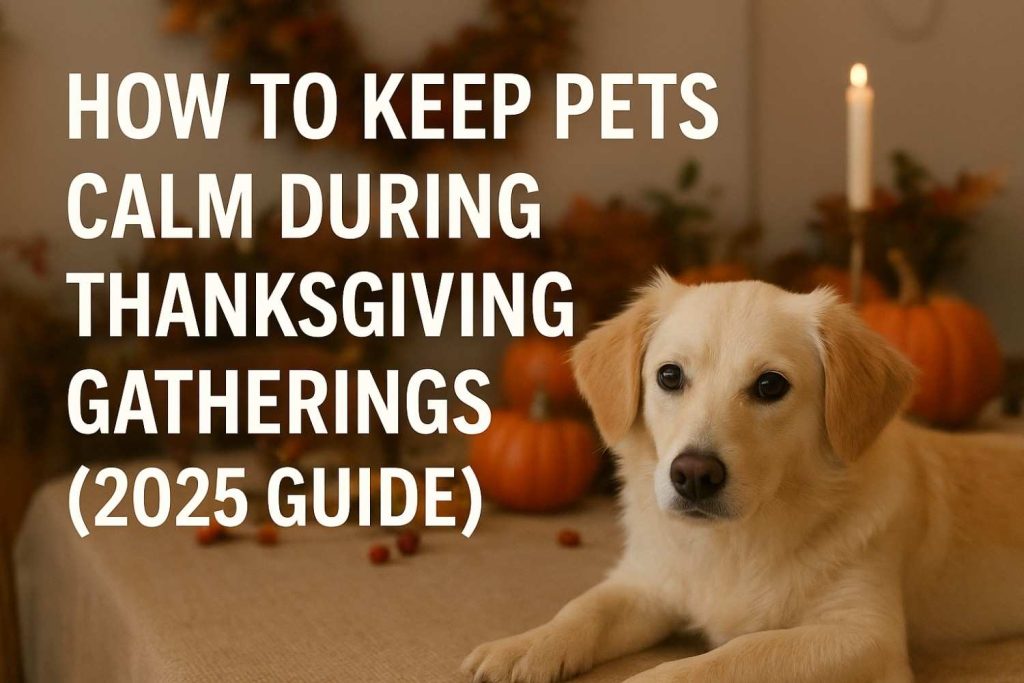Thanksgiving is one of the most celebrated holidays in the U.S., filled with family, food, and fun. But while humans enjoy the holiday feast, our furry companions often feel stressed by the sudden noise, unfamiliar faces, and tempting smells. Loud chatter, the doorbell ringing, children running around, and delicious food can make Thanksgiving overwhelming for pets.
If you’re wondering how to keep pets calm during Thanksgiving gatherings in 2025, this complete guide covers everything you need—from setting up safe spaces to managing diet, training, and travel. By planning ahead, you’ll create a peaceful environment where your pets feel secure and happy.

Why Thanksgiving Can Be Stressful for Pets
Pets thrive on routine. When that routine is interrupted by large gatherings, their anxiety often spikes. Some common stressors include:
-
Noise levels: Guests talking loudly, kitchen appliances running, music, or even football games on TV.
-
Unfamiliar people: Strangers entering the home can make pets defensive or shy.
-
Strong food smells: Dogs especially may beg, whine, or steal food.
-
Overstimulation: Kids wanting to play, people petting them too much, or being passed around.
-
Traveling: Visiting relatives or staying in new environments can unsettle pets.
1. Create a Quiet Space for Your Pet
A safe retreat is the number one way to reduce stress.
-
Choose a separate room (bedroom or study) away from the dining area.
-
Add familiar items—your pet’s bed, blanket, favorite toys, and water.
-
Keep lights dim and curtains drawn to reduce visual stimulation.
-
Play calming background noise, like soft music, white noise, or pet-calming playlists (available on Spotify and YouTube).
-
For cats, consider adding a scratching post or hiding box.
This gives pets control over their environment and reduces the pressure of social interaction.
2. Stick to Your Pet’s Normal Routine
Consistency makes pets feel secure. During Thanksgiving chaos:
-
Feed your pet at their usual mealtimes to avoid begging during dinner.
-
Stick to the same morning walk schedule even if you’re busy preparing food.
-
Maintain normal playtime so pets don’t feel neglected.
If guests arrive early, take time to greet your pet first—it helps reassure them that everything is okay.
3. Give Pets Exercise Before Guests Arrive
Exercise helps release energy and reduce anxiety.
-
Take your dog for a long walk or jog before guests arrive. A tired dog is calmer and less likely to jump on people.
-
Play fetch or tug-of-war to burn off energy.
-
For cats, interactive play with wand toys or lasers helps channel nervous energy.
-
Consider a trip to the dog park earlier in the day.
Pets that have released pent-up energy will settle more easily during the gathering.
4. Train “Settle” or “Place” Commands in Advance
Basic training reduces stress for both pets and owners.
-
Practice the “place” command by teaching your dog to stay on their bed or mat until released.
-
Reward with small treats when they stay calm in their spot.
-
For cats, train with a designated perch or tower where they can safely observe.
-
Start practicing at least 1–2 weeks before Thanksgiving.
This way, your pet already knows how to stay calm when dinner is served.
5. Use Calming Aids if Needed
Some pets need extra help managing stress. Options include:
-
Calming chews or supplements with natural ingredients like chamomile or L-theanine.
-
Pheromone sprays/diffusers (e.g., Adaptil for dogs, Feliway for cats).
-
Calming vests or wraps (like ThunderShirt) that apply gentle pressure.
-
Herbal remedies or CBD (vet-approved only).
Always consult your vet before introducing new calming products.
6. Supervise Food and Table Scraps
Thanksgiving food smells delicious, but many dishes are unsafe for pets. Toxic or dangerous foods include:
-
Turkey bones (choking hazard)
-
Fatty skin, gravy, and stuffing (can cause pancreatitis)
-
Onions, garlic, grapes, raisins, and chocolate (toxic)
-
Alcohol and caffeine (very dangerous)
To avoid accidents:
-
Politely remind guests not to feed scraps to pets.
-
Keep trash bins secure with tight lids.
-
Offer pet-safe holiday treats instead, like pumpkin puree or store-bought pet chews.
7. Introduce Guests Slowly
Meeting new people can overwhelm pets. To help:
-
Allow pets to approach guests on their own terms.
-
Ask children to be gentle and quiet when petting.
-
Avoid forcing pets into the center of activity.
-
Provide guests with treats to help pets feel positive associations.
If your pet is shy, limit interaction to a few people at a time.
8. Offer Distractions During Dinner
Keeping pets busy helps prevent begging and food stealing.
-
Use puzzle toys filled with kibble or peanut butter.
-
Offer long-lasting chews or bones designed for dogs.
-
Provide lick mats with pumpkin or plain yogurt.
-
For cats, use treat-dispensing balls or climbing toys.
This creates positive distractions while guests enjoy dinner.
9. Consider Pet-Friendly Travel Tips (If Visiting Family)
If you’re traveling:
-
Bring your pet’s essentials: food, bowls, toys, and medications.
-
Use a crate or carrier for safe car travel.
-
Stop for bathroom and stretch breaks every 2–3 hours.
-
If staying overnight, introduce pets to the new environment slowly.
10. Be Prepared for Emergencies
Despite precautions, accidents happen. Prepare with:
-
Vet’s phone number saved in your contacts.
-
Knowledge of the nearest 24/7 emergency clinic.
-
A pet first-aid kit with bandages, antiseptic, and gloves.
-
Awareness of ASPCA Poison Control hotline.
Quick action can save your pet’s life in emergencies.
11. Offer Extra Comfort After Guests Leave
When the house finally quiets down, give pets extra love.
-
Spend cuddle time on the couch or bed.
-
Offer a favorite toy or treat.
-
Talk softly to reassure them.
-
Return to their usual nighttime routine (walks, feeding, bedtime).
12. Bonus: Grooming & Appearance Tips
Holidays often include photos! Make sure pets look and feel their best.
-
Brush them before guests arrive.
-
Trim nails to prevent scratches.
-
Use festive, comfortable collars or bandanas (avoid costumes that restrict movement).
A clean, happy pet will be more comfortable around guests.
Final Thoughts
Thanksgiving should be joyful for the whole family—including pets. By preparing in advance, maintaining routines, and creating a calm environment, you’ll reduce stress and prevent accidents.
In 2025, pet wellness and holiday safety go hand in hand. Whether you’re hosting a big dinner in New York City or traveling across Texas to visit family, these strategies will ensure your pets feel safe, happy, and loved during Thanksgiving gatherings.



